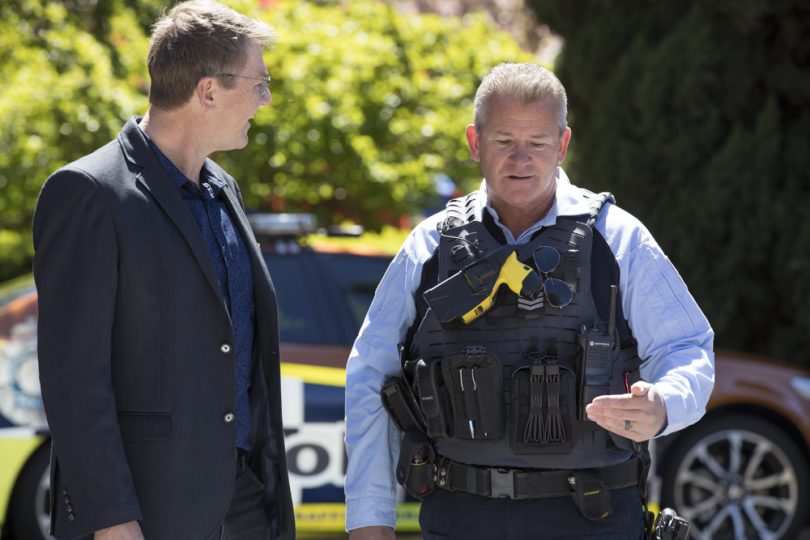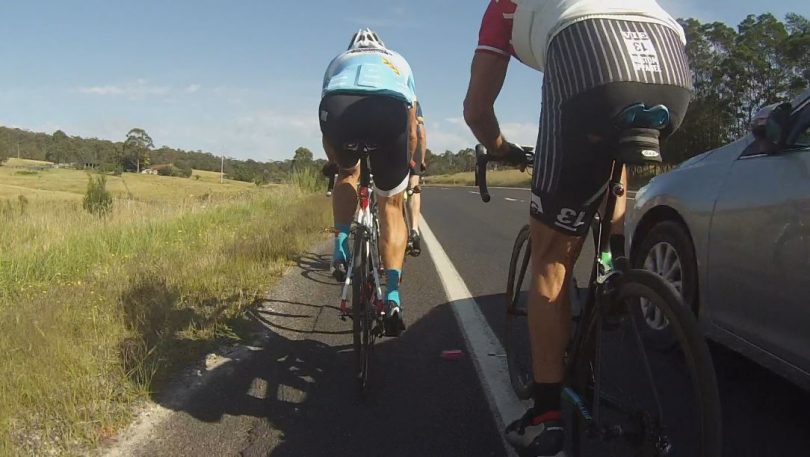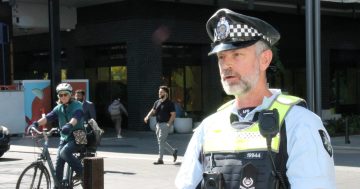
Pedal Power ACT CEO Ian Ross with Detective Acting Station Sergeant Marcus Boorman. Photo: Michelle Kroll, Region Media.
ACT police officers will don lycra and get on their bikes to target motorists who aren’t obeying the minimum passing laws when overtaking cyclists.
In the ACT, drivers are required to keep a minimum passing distance of 1 metre when overtaking a cyclist at under 60 km/h, with a distance of 1.5 metres required if a driver is overtaking at more than 60 km/h. Drivers who fail to comply with the law can receive a $292 fine and a loss of two demerit points.
ACT Policing has announced they will conduct compliance activity targeting motorists who don’t obey the law when passing cyclists on ACT roads.
Detective Acting Station Sergeant Marcus Boorman said ACT Policing had focused on an educational approach since the laws came into effect but in the coming weeks they will “proactively enforce” the law.
“The upcoming activity will see police actively target the minority of motorists that are not doing the right thing,” Sergeant Boorman said.
“Canberra: you are on notice. The next cyclist you drive past could be a police officer, and fines and demerit points may be issued if you do not leave enough room.
“Officers will not be in police uniform, so they will look like any other cyclist.”
The ACT’s minimum passing laws were introduced in 2015 on a trial basis and were permanently implemented last year. During the two-year trial, only 11 motorists were issued with a traffic infringement notice or caution for not obeying the laws.

Pedal Power ACT CEO Ian Ross said it is a “truly terrifying experience” when cars pass too close. Photo: Kate Smith.
An ACT Government study, which was released in May, found that the majority of ACT drivers obey the minimum passing rules when overtaking cyclists on the road, with over 16,400 overtaking vehicles recorded during a four week period in 2018.
The study, which was undertaken by the University of Adelaide’s Centre for Automotive Safety Research, found 97.3 per cent of motorists kept a one-metre distance when the speed limit was below 60 km/h, while 88.8 per cent of drivers on roads with a speed limit above 60 km/h kept a distance of 1.5 metres.
Sergeant Boorman said more than one-in-ten motorists not obeying the 1.5-metre passing distance was not good enough.
“It is about everybody doing the best they can to promote road safety in the ACT,” he said. “If you are unsure, slow down, take those couple of seconds and leave plenty of room.”
Even though they will be dressed as cyclists, Sergeant Boorman also said his officers will not turn a blind eye to their fellow road users who do the wrong thing.
“I can assure you that while we are conducting this operation, if we see any cyclists that are not doing the right thing there will be consequences,” he said.
Pedal Power ACT chief Ian Ross welcomed the ACT Policing’s enforcement campaign, which is believed to be an Australian first. He said he hopes it will be as successful as similar campaigns in the UK which saw a 20 per cent reduction in cycling deaths and serious accidents.
“You can feel the wind and the suck of a car as it moves past you and you can get buffeted on the road,” Mr Ross shared. “It is a truly terrifying experience.
“Having police enforce the minimum passing distance laws is important not just for the people who are already riding, but to encourage more people to take up cycling for transport and recreation. We want everybody to feel safe and be safe when riding on our roads.”
To provide space on narrow roads, motorists are allowed to cross or straddle the centre lines, provided the driver has a clear view of any approaching traffic and that it is safe to do so. If it is not safe to pass, drivers must wait behind the cyclist.
Do you know how to safely overtake a cyclist?Be patient and leave at least 1 metre distance when passing at 60km/h or less or 1.5 meters for speeds over 60km/h. Remember if you’re unsure, leave more!To learn more about your responsibilities on the road visit: goo.gl/VTSUqN#ShareTheRoad #UnsureLeaveMore
Posted by ACT Policing on Thursday, August 23, 2018














